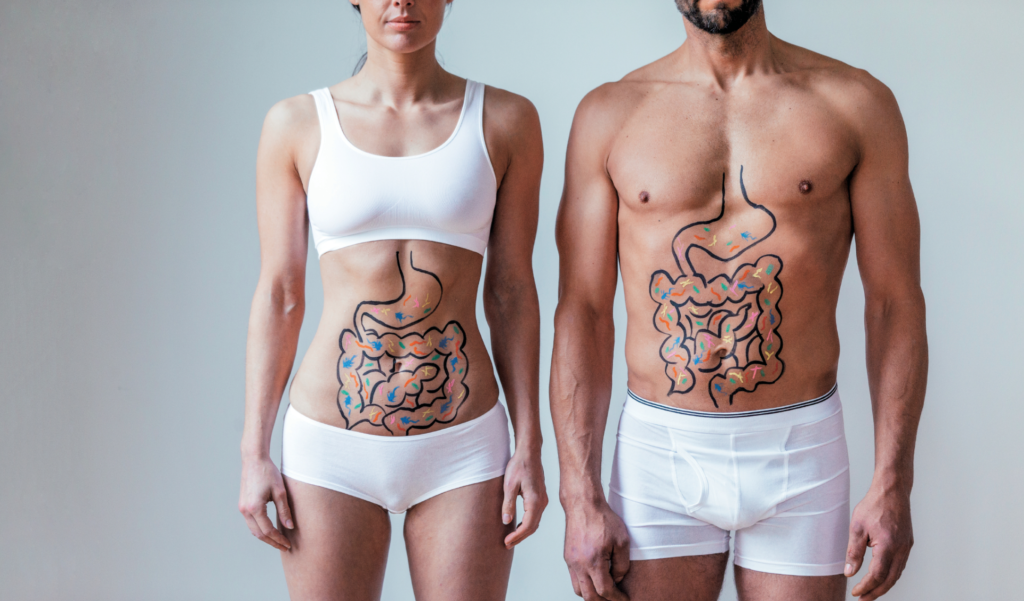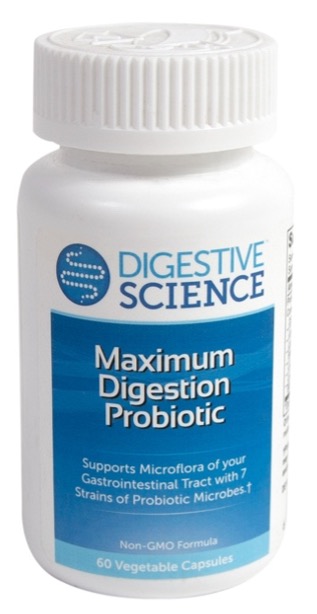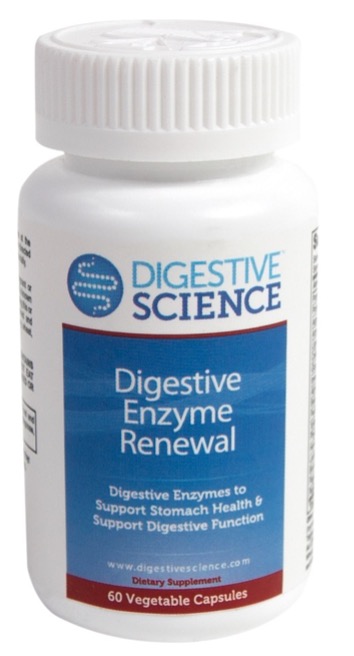We’ve long known that gut health plays a huge role in health and well-being. Far from being more than just the ‘in and out’ system previous generations took it for, gut health affects just about every inch of your body, from your brain to your fingers – and just about everything in between.
Dr. Steven Lamm even goes so far to call the gut your ‘surrogate brain’[1].
A new study builds on this. It also adds a new and interesting twist to gut health: not only does having a healthier gut help your body and mind, it also has an especially important effect on your lungs.
Gut Health Improves Lung Function According to Study
The new study, published in the journal Gut Microbes last week[2], found that healthy gut bacteria, called probiotics, appear to help overall respiratory health. Researchers came to this conclusion after reviewing food and supplement journals of 220 people who had been in an earlier study on the link between probiotics and weight loss.
Among their methodology, they also looked at whether folks who used probiotics were at higher or lower risk of upper respiratory infections. Or to put it simply, did probiotics make lung health better or worse?
It turns out probiotics showed up and helped lung function. Folks who had been in the earlier study between probiotics and weight loss rather than a placebo group experienced an overall 27% lower incidence of respiratory problems. That affect was especially pronounced in patients that were at least 45 years old, and those who were obese.

Age and Obesity Can Affect Lung Function
While it may not be immediately apparent, the link makes sense. Older patients and those that struggle with obesity are at high risk of respiratory problems. Obesity can have a negative impact on the lungs, in part because it compresses the chest wall. In turn, that can lead to symptoms that resemble asthma, like wheezing.
Obesity is also linked to lower immune function. That alone can increase risk of respiratory problems.
Being over 45 also increases risk of pulmonary disease[3] if it’s not controlled, the most common threat of which appears to be pneumonia transmitted with the community.
Gut Health and Your Body
Serotonin is a neurotransmitter linked to feelings of greater well-being. As its a ‘neurotransmitter’, you might think your brain makes this happy messenger.
Yet curiously, 90% of your serotonin is made in your gut. Serotonin then travels between the gut and your brain in a link so crucial that it’s called the ‘gut-brain axis’[4].
And while this is already a known and powerful link, lesser-known, yet also significant appears to be the link between gut health and the lungs.
Here’s where we’re going with this: for optimal gut health, you need a GI tract that’s full of healthy gut microbiomes – probiotics. We’ve talked about probiotics before here at Leading Edge Health. They’re healthy gut bacteria that live in your digestive system and perform a variety of functions. And considering the modern North American diet can alter the variety of probiotics vs harmful bacteria, you may find that a probiotic supplement goes a long way for better health.
Benefits of Probiotics
Here’s why you might want to put probiotics in your stomach, either with your diet or with a supplement like Maximum Digestion Probiotic. Among other things, probiotics can help:
Balance Good Vs. Harmful Bacteria – There’s a war going on in your gut. You’ve heard of some of the nastier gut bacteria, like ecoli and salmonella. But there are many others than can throw your health off course.
Many factors, including illness, medication (some antibiotics are notorious for altering gut health and related bacteria) and poor diet. This can lead to digestive problems, obviously, but also obesity, allergies and even mental health issues.
Prevent and Treat Diarrhea – Here’s an obvious benefit to probiotics and better gut health in general. Diarrhea is a common symptom of certain antibiotics because they can alter your balance of good versus harmful gut bacteria.
Probiotics may lower risk of infectious diarrhea and traveler’s diarrhea as well.
Some Mental Health Conditions – Probiotics may actually help some mental health conditions. That may sound like a stretch but hear us out on this. One review of 15 human studies found that volunteers who took two forms of probiotics for one to two months found they had less anxiety, depression, autism, OCD and even better memory.
Another study of 70 chemical workers found that volunteers who took a probiotic yogurt or capsule daily for six weeks had overall improved health, less depression, anxiety and lowered their stress.
Better Heart Health – We briefly touched earlier on the link between better gut health and wellness of the heart. Probiotics lower LDL – AKA the ‘bad’ cholesterol. In turn, that can help lower your blood pressure and a variety of health ailments that could send you to an early grave.
Granted, that’s a lot to unpack, but here’s where probiotics come into play. Probiotics break down bile – a natural fluid that is made primarily of cholesterol, and which helps digestion. In doing so, probiotics contribute to better health of the heart, and when you consider heart disease is one of the leading causes of death, you see how gut health and heart health are inextricably linked.
May Reduce Eczema and Some Allergies – Gut health helps the skin as well. One study found the children of women who took probiotics while pregnant were 83% less likely to develop eczema in their first two years of life[5].
There is further evidence to suggest probiotics may reduce dairy and several allergies, although this evidence is not yet strong and more studies are needed.

May Reduce Some Digestive Disorder Symptoms – Probiotics might reduce symptoms for a variety of digestive disorders, including ulcerative colitis and Chrohn’s disease[6]. For the former, some evidence suggests probiotics may be just as effective as drugs for people recovering from ulcers.
Having good gut health through probiotics may also reduce symptoms of irritable bowel syndrome and even lower risk of severe necrotizing enterocolitis[7] – an often fatal bowel condition in premature infants.
May Boost Immune Function – You can thank probiotics for cutting down on your sick days. There’s an obvious reason for that – probiotics reduce harmful bacteria in the gut. But they’re also shown to help the body make more natural antibodies and make more immune cells.
As we’ve seen, probiotics are linked to fewer respiratory problems. They can also help reduce urinary tract infections in women by up to 50%[8]
May Help With Weight Loss – Finally, if you’re looking for an easy way to lose weight, probiotics may help. You can thank the link between probiotics and gut health for a variety of reasons. Among them, some probiotics simply prevent the intestine from absorbing fat from your diet, and simply secrete it through your feces.
Probiotics may also help the body make more of a hormone called GLP-1, which helps you feel full for longer and burn calories faster[9]. And there is further evidence that probiotics can lead to direct weight loss. Case in point, one study which found that women who supplemented with probiotics for three months lost 50% more weight that women who took no probiotics in that time[10].
With that said, there is still much we don’t know about probiotics and weight loss. Studies continue – though it’s clear that to have optimal gut health, you need a GI tract with a robust variety of healthy gut microflora.
You could also consider switching to the Mediterranean diet and reap the benefits. Find out more in our post, “The Mediterranean Diet and Anti-Aging.”
Best Supplements For Gut Health
Here’s where we stand. We know gut health is linked to better function of the lungs. We also know probiotics are key to having better gut health, and they may help your overall health and wellness in many ways, from fewer digestion problems to weight loss, lower chance of certain skin conditions and even a reduced risk of some mental health conditions.
A little gut health goes a long way.
So how do you get ‘better gut health’? That’s a topic to itself. If you want the quick version though, think about putting these two supplements in your gut. Then sit back and watch them do some surprisingly effective things for your body.

#1 – Maximum Digestion Probiotic – 10 Strains of Healthy Probiotics
Our top pick for the best probiotic supplement, Maximum Digestion Probiotic is a great option for folks who want better gut health. It’s made by Digestive Science – one of the best names among natural digestion supplements and one you can trust.
It’s made of 10 strains of Lactobacillus and Bifidobactum probiotics, which can have a positive effect on your gut health, skin, hair, immune function and mental wellness.
We also like that Maximum Digestion Probiotic has a 67 day money-back guarantee.
There is no question that a probiotic supplement can help you address the factors that can have a negative impact on your balance of good versus harmful gut bacteria, be they illness, stress, diet or medication. If you’re concerned about any one of these, Maximum Digestion Probiotic is definitely a keeper.
Learn More At:

#2 – Digestive Enzyme Renewal – For Enzyme Deficiency
Probiotics play a major role in gut health. But here’s another issue that tends to fly under the radar, and can have just as much of an impact on your GI tract. About 90% of medical patients over 40 are low in digestive enzymes.
So what, you ask?
Here’s why that matters. Cooking kills much of the enzymes in your diet that your body uses to break down food. Without enough digestive enzymes, you force your gut to make more stomach acid to pick up the slack, so to speak.
But it can’t do that forever. And once that happens, expect a world more digestion problems. Think gas, constipation, diarrhea and IBS symptoms.
Oh the joys of being low in digestive enzymes.
Now you see why Digestive Enzyme Renewal is such a good idea. Do it for better gut health and overall wellness. When the former is working, the rest of you tends to work as well. Nurture your gut. Your body will do the rest.
Learn More At:
Also read up on, “What is Leaky Gut Syndrome?” to find out how to feel your best.
[1] https://pressroom.journolink.com/enzymedicauk/release/no_guts_no_glory_520
[2] https://ddwnews.org/news/probiotics-may-help-reduce-symptoms-of-respiratory-infections-in-vulnerable-populations/
[3] https://www.ncbi.nlm.nih.gov/pmc/articles/PMC3297767/
[4] https://www.ncbi.nlm.nih.gov/pmc/articles/PMC6366671/
[5] https://pubmed.ncbi.nlm.nih.gov/23083673/
[6] https://pubmed.ncbi.nlm.nih.gov/23083673/
[7] https://pubmed.ncbi.nlm.nih.gov/24723255/
[8] https://pubmed.ncbi.nlm.nih.gov/11387176/




